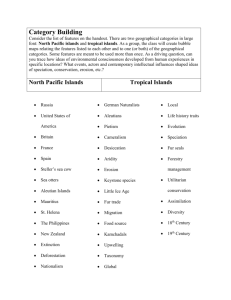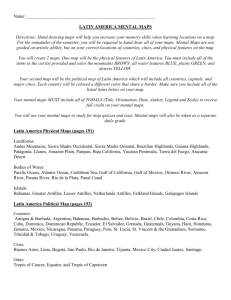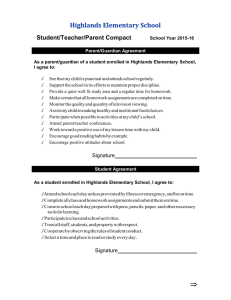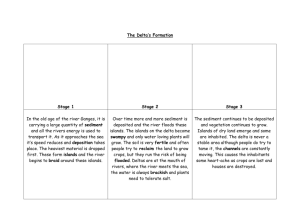Models of collaboration: UHI Millennium Institute
advertisement
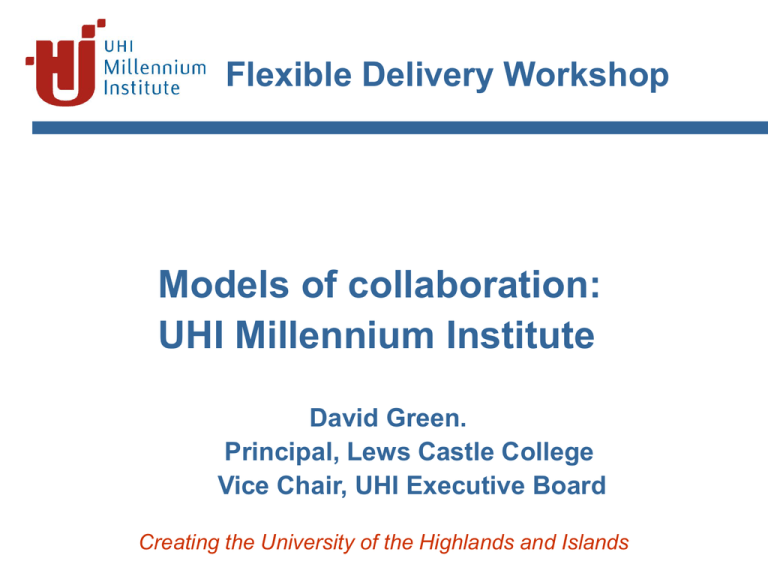
Flexible Delivery Workshop Models of collaboration: UHI Millennium Institute David Green. Principal, Lews Castle College Vice Chair, UHI Executive Board Creating the University of the Highlands and Islands Creating the University of the Highlands and Islands Pressures to extend HE into remote & rural areas political – (mass HE, equity & the concept of entitlement); economic - (perceived benefits for local economies); social - (retention of population); cultural - (promotion or preservation of local history, cultures and languages) Creating the University of the Highlands and Islands Issues to be addressed efficiency - (scattered population, small teaching groups); quality in L&T & R - (multiple locations, small partner institutions, H.E. new to many staff); access - (distances, remote locations, poor transport & communications); participation - (no tradition of local HE, excluded groups) Creating the University of the Highlands and Islands UHI approach to these issues use of ICT to support learning & administration over large distances; local colleges & learning centres for easier access and local support; colleges recruit non-traditional learners and bring them into HE; links with other universities & institutes to develop research strong staff development and QA policies Creating the University of the Highlands and Islands Europe’s last wilderness… Creating the University of the Highlands and Islands 0 Creating the University of the Highlands and Islands Netherlands Germany Italy Denmark Austria Greece Sweden Finland Norway Highlands & Islands Scotland United Kingdom Persons per sq km Population Density 400 350 300 250 200 150 100 50 Features of the Highlands & Islands region huge area with low population low incomes – c75% of EU average peripheral region – 90+ inhabited islands population loss from remoter areas dominance of small/medium enterprises some population growth (20% since 1960s), economic diversification & localised growth Creating the University of the Highlands and Islands Creating a University for the Highlands and Islands began as a collaborative project 1992 sponsored by regional government & development agency aims: - bring HE to a remote area - regional economic development - social & cultural development Creating the University of the Highlands and Islands UHI Partnership 14 academic partners – community colleges – specialist colleges – research institutions >50 learning centres area >40,000 km² >90 inhabited islands students & campuses linked by ICT Creating the University of the Highlands and Islands Progress approved by the Scottish Parliament as a Higher Education Institution in 2001 granted university-level funding 2004 target for full University title –2007? Creating the University of the Highlands and Islands Unique Features employs no academic staff per se owns no buildings or equipment except the Executive Office a Partnership/ Joint Venture contractual supply agreements built on existing institutions federal and collegiate in structure close links to local communities innovative networked learning model Creating the University of the Highlands and Islands UHI Students mainly local full-time 48%, part-time 52% mature (25 years and over) c60% male 46%, female 54% more with non-standard entry qualifications more from lower socio-economic groups Creating the University of the Highlands and Islands The UHI learning experience traditional face-to-face lectures, tutorials and seminars flexible/supported/distributed learning: – – – – video and audio conferencing paper-based materials web-based materials e-communications, including net meeting Creating the University of the Highlands and Islands ICT Connectivity broadband connections between major centres linked into UK academic network provides: - email, internet,VC, telephony & student data systems Creating the University of the Highlands and Islands Academic provision 3 main elements: a broadly-based curriculum widely available throughout the network specialist courses and centres short courses tailored to CPD needs of local employers/professionals Creating the University of the Highlands and Islands UHI research environmental sciences – international standing developing capabilities in other areas: – – – – – – – aquaculture and mariculture rural development language, culture and migration archaeology and heritage bio-medical and health care renewable energy nuclear de-commissioning Creating the University of the Highlands and Islands Lessons learned (1) : collaboration issues clarity: - of aims, plans, resources, agreements, targets, responsibilities; communication: - of information (as above); - with sponsors, staff, students, communities; consultation: - with stakeholders on issues that affect them Creating the University of the Highlands and Islands Lessons learned (2): teaching & research curriculum development: - check the need - prioritise the activity - control the budget research: - identify strengths & opportunities - prioritise areas to focus on - research for some, scholarship for all? Creating the University of the Highlands and Islands Lessons learned (3): organisation design simple, effective structures & processes for development; modify these to match changing circumstances; minimise the risk from individuals & institutions – publish agreements & maximise information flow Creating the University of the Highlands and Islands Continuing challenges organisational: - maintaining the partnership; - managing tensions financial: - cost of delivery across large areas - small teaching groups - maintaining infrastructure academic: - gaining credibility for an unconventional institution Creating the University of the Highlands and Islands Case Study: Rural Development Studies • RDS was first UHI networked degree, validated by University of Aberdeen (1994) • Not closely identified with ICT • Modular structure • Inter-disciplinary studies • Variety of learning methods • Variety of assessment instruments • Close links with other degrees Creating the University of the Highlands and Islands How RDS courses are taught • • • • • • • Face to face Paper based Telephone tuition Email support Video-conference link Web-based resources Net meeting Creating the University of the Highlands and Islands Experiences with technology • Technical problems: – Breakdown – Complexity – Cost People problems: -inexperience -Fear -Personal touch Creating the University of the Highlands and Islands Advantages of mixed format • • • • • • • Distance and time flexibility Consistency of learning resources Subject and student sensitive Resource used in appropriate context Allows rapid updating Provides students with extra skills Gives students more power Creating the University of the Highlands and Islands Lessons for ‘remote’ delivery • • • • • • • Needs to be responsive Needs to be interactive Needs to be reliable Needs a stable platform Needs to be consistent Needs to be networked Needs to be supported by training Creating the University of the Highlands and Islands Case Study conclusions • A mixed format delivery is best • Optimum mix varies with module/course/academic level and individual • Local learning centres help stability • Needs careful management (ac+tech) • Needs staff development (ac+tech) • High or low tech – must be professional Creating the University of the Highlands and Islands

